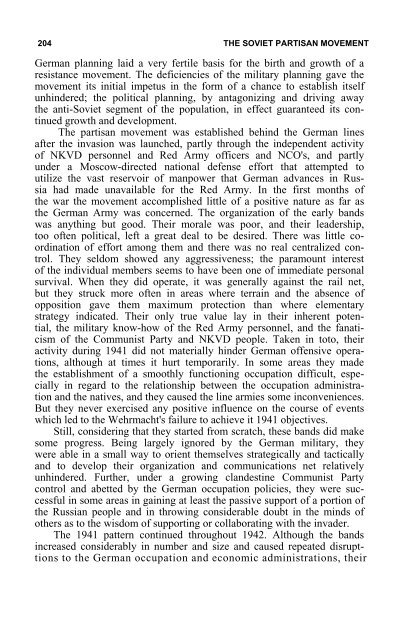the soviet partisan movement 1941-1944 by edgar m. howell
the soviet partisan movement 1941-1944 by edgar m. howell
the soviet partisan movement 1941-1944 by edgar m. howell
Create successful ePaper yourself
Turn your PDF publications into a flip-book with our unique Google optimized e-Paper software.
204 THE SOVIET PARTISAN MOVEMENT<br />
German planning laid a very fertile basis for <strong>the</strong> birth and growth of a<br />
resistance <strong>movement</strong>. The deficiencies of <strong>the</strong> military planning gave <strong>the</strong><br />
<strong>movement</strong> its initial impetus in <strong>the</strong> form of a chance to establish itself<br />
unhindered; <strong>the</strong> political planning, <strong>by</strong> antagonizing and driving away<br />
<strong>the</strong> anti-Soviet segment of <strong>the</strong> population, in effect guaranteed its continued<br />
growth and development.<br />
The <strong>partisan</strong> <strong>movement</strong> was established behind <strong>the</strong> German lines<br />
after <strong>the</strong> invasion was launched, partly through <strong>the</strong> independent activity<br />
of NKVD personnel and Red Army officers and NCO's, and partly<br />
under a Moscow-directed national defense effort that attempted to<br />
utilize <strong>the</strong> vast reservoir of manpower that German advances in Russia<br />
had made unavailable for <strong>the</strong> Red Army. In <strong>the</strong> first months of<br />
<strong>the</strong> war <strong>the</strong> <strong>movement</strong> accomplished little of a positive nature as far as<br />
<strong>the</strong> German Army was concerned. The organization of <strong>the</strong> early bands<br />
was anything but good. Their morale was poor, and <strong>the</strong>ir leadership,<br />
too often political, left a great deal to be desired. There was little coordination<br />
of effort among <strong>the</strong>m and <strong>the</strong>re was no real centralized control.<br />
They seldom showed any aggressiveness; <strong>the</strong> paramount interest<br />
of <strong>the</strong> individual members seems to have been one of immediate personal<br />
survival. When <strong>the</strong>y did operate, it was generally against <strong>the</strong> rail net,<br />
but <strong>the</strong>y struck more often in areas where terrain and <strong>the</strong> absence of<br />
opposition gave <strong>the</strong>m maximum protection than where elementary<br />
strategy indicated. Their only true value lay in <strong>the</strong>ir inherent potential,<br />
<strong>the</strong> military know-how of <strong>the</strong> Red Army personnel, and <strong>the</strong> fanaticism<br />
of <strong>the</strong> Communist Party and NKVD people. Taken in toto, <strong>the</strong>ir<br />
activity during <strong>1941</strong> did not materially hinder German offensive operations,<br />
although at times it hurt temporarily. In some areas <strong>the</strong>y made<br />
<strong>the</strong> establishment of a smoothly functioning occupation difficult, especially<br />
in regard to <strong>the</strong> relationship between <strong>the</strong> occupation administration<br />
and <strong>the</strong> natives, and <strong>the</strong>y caused <strong>the</strong> line armies some inconveniences.<br />
But <strong>the</strong>y never exercised any positive influence on <strong>the</strong> course of events<br />
which led to <strong>the</strong> Wehrmacht's failure to achieve it <strong>1941</strong> objectives.<br />
Still, considering that <strong>the</strong>y started from scratch, <strong>the</strong>se bands did make<br />
some progress. Being largely ignored <strong>by</strong> <strong>the</strong> German military, <strong>the</strong>y<br />
were able in a small way to orient <strong>the</strong>mselves strategically and tactically<br />
and to develop <strong>the</strong>ir organization and communications net relatively<br />
unhindered. Fur<strong>the</strong>r, under a growing clandestine Communist Party<br />
control and abetted <strong>by</strong> <strong>the</strong> German occupation policies, <strong>the</strong>y were successful<br />
in some areas in gaining at least <strong>the</strong> passive support of a portion of<br />
<strong>the</strong> Russian people and in throwing considerable doubt in <strong>the</strong> minds of<br />
o<strong>the</strong>rs as to <strong>the</strong> wisdom of supporting or collaborating with <strong>the</strong> invader.<br />
The <strong>1941</strong> pattern continued throughout 1942. Although <strong>the</strong> bands<br />
increased considerably in number and size and caused repeated disrupttions<br />
to <strong>the</strong> German occupation and economic administrations, <strong>the</strong>ir
















